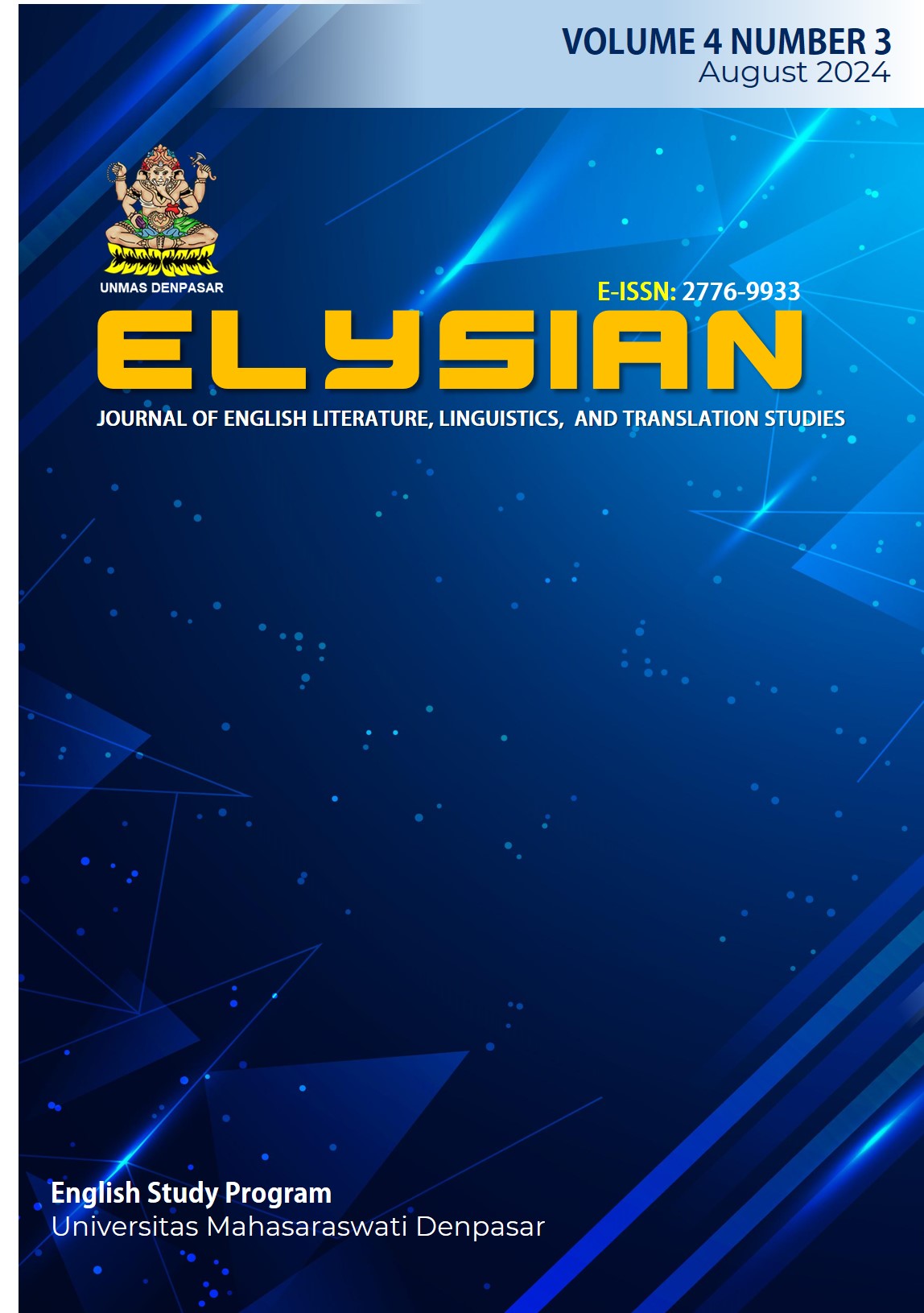The Illocutionary Acts Found in the Summer I Turned Pretty Film
DOI:
https://doi.org/10.36733/elysian.v4i3.7567Abstract
This study aimed to analyze the type of speech acts and the classification This text discusses the importance of language as a system of communication between speakers and listeners, and how language is used to convey feelings or share information through speech acts. illocutionary acts refer to the intended meaning of a statement. It is an example of a form of speech act that has been culturally defined and is distinguished by a distinctive illocutionary force. For instance, making promises, giving advice, and making threats are all instances of illocutionary activities. Speech acts theory looks at the pragmatic function of utterances.The theory is premised on the belief that language is used to perform actions. Films are cultural products produced by certain cultures that help individuals of various languages and cultures to communicate with one another. The text presents a literature review that discusses the different types of illocutionary acts and how they are used in human communication. Finally, the text presents the research methodology, findings, and discussion of a study that analyzes the types of illocutionary acts used in the conversations of season 2 of "The Summer I Turned Pretty." The study uses a qualitative method to analyze the data and identifies representative and directive illocutionary acts in the conversations. Overall, the text provides an overview of the importance of language and speech acts in human communication, and how they are studied in the field of pragmatics.
References
“Commissive.” Merriam-Webster.com Dictionary, Merriam-Webster, https://www.merriam-webster.com/dictionary/commissive. Accessed 17 Aug. 2023.
Alston, W., 2000. Illocutionary acts and sentence meaning, Ithaca, NY: Cornell University Press.1994. ‘Illocutionary acts and linguistic meaning,’ in Tsohatzidis (ed.), pp. 29–49.
Alston, William P. Tindak Tutur Ilokusi dan Makna Kalimat. Ithaca: Cornell University Press. 2000
Austin, J. L. (1975). How to Do Things with Words. Oxford University Press.
Britannica, The Editors of Encyclopaedia. "speech act theory". Encyclopedia Britannica, 1 Nov. 2013, https://www.britannica.com/topic/speech- act-theory.
Cohen, T. (1973). Illocutions and perlocutions. Foundations of Language, 9(4),492-503.
Frafika Sari, I. . (2021). Indirect Speech Act of Spongebob Squarepants the Movie. International Journal of English and Applied Linguistics (IJEAL), 1(3), 203-206. https://doi.org/10.47709/ijeal.v1i3.1220
Levinson, Stephen C., 'Speech Acts', in Yan Huang (ed.), The Oxford Handbook of Pragmatics, Oxford Handbooks (2017; online edn, Oxford Academic, 1 May 2013), https://doi.org/10.1093/oxfordhb/9780199697960.013.22
Sari, P. I., & Pranoto, B. E. (2022). an Analysis of Illocutionary Act and Perlocutionary Act Towards the Queen Elizabeth’S Speech Entiteld We Will Succeed and Better Days Will Come. Linguistics and Literature Journal, 3(1), 24-33.
Severny, Andrei (September 5, 2013). "The Movie Theater of the Future Will Be In Your Mind". Tribeca. Archived from the original on September 7, 2013. Retrieved September 5, 2013.
Stiles, W. (1981). Classification of intersubjective illocutionary acts. Language in Society, 10(2), 227-249. doi:10.1017/S0047404500008654
Usó-Juan, E., & Martínez-Flor, A. (2021). Fostering learners’ (meta)pragmatic awareness through film analysis. Language Value, 14(1), 85-111. https://doi.org/10.6035/languagev.5821








